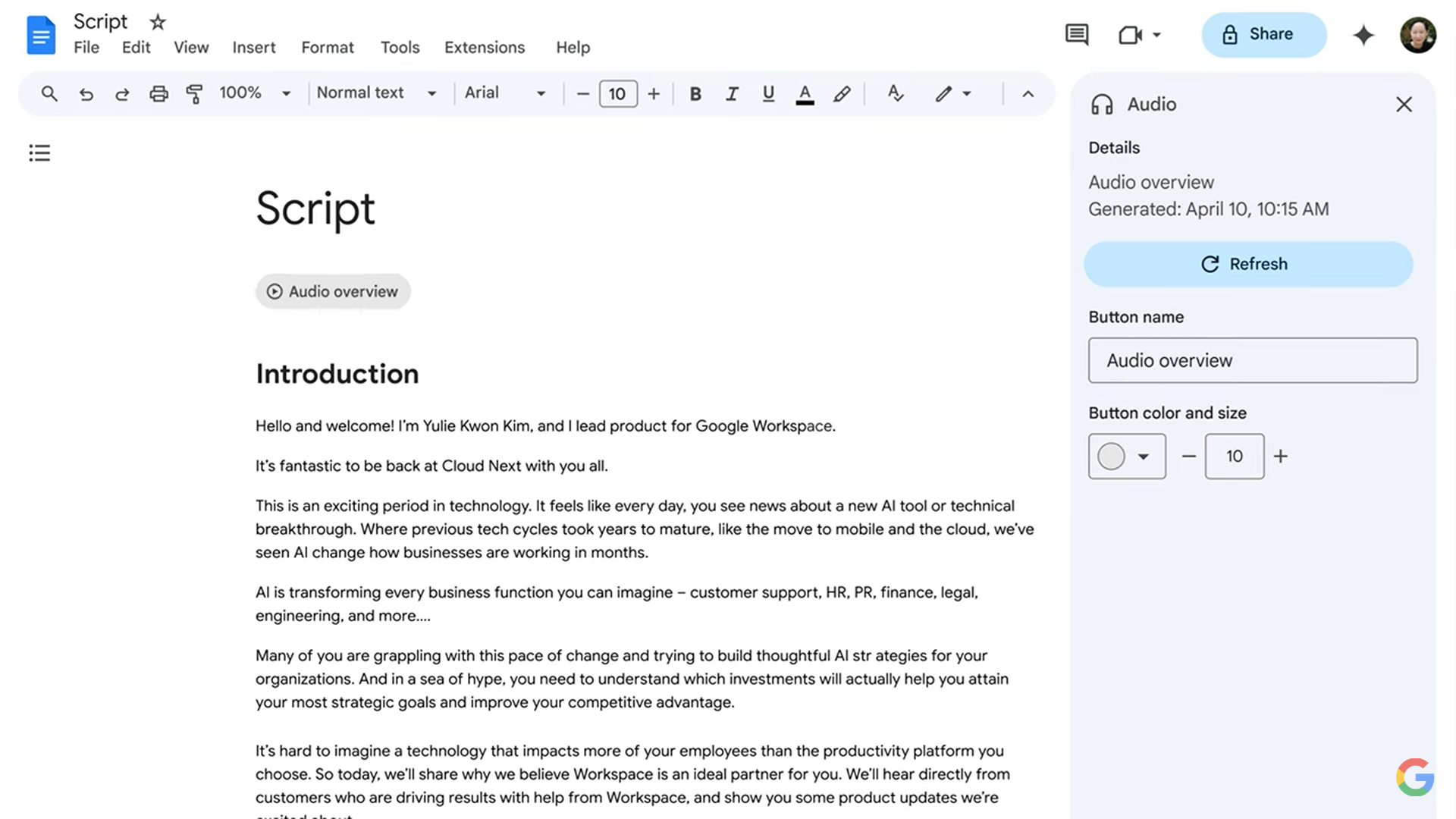Google Cloud Next 2025 Unveils Major AI Enhancements to Docs, Sheets, and More, Bringing Audio Creation and Workflow Automation to Millions of Users
Google has unveiled a sweeping array of new Gemini AI-powered features for Workspace, transforming its productivity suite with audio capabilities, automated workflows, and enhanced writing tools. Announced at Google Cloud Next 2025, these updates aim to streamline document creation, automate repetitive tasks, and introduce new ways to consume and share content across Docs, Sheets, Chat, and Vids.
Key Developments in Google's AI-First Workspace
The most striking addition is Audio Overviews in Google Docs, a feature that enables users to convert written documents into podcast-style audio content. This tool offers two primary options: having the AI read documents aloud in a natural-sounding voice or generating condensed podcast-style summaries highlighting key points TechRadar1.
"Reading your writing out loud is one of the best ways to discover any mistakes or awkwardness," notes TechRadar, explaining how the feature helps users identify typos and stilted phrases that might be missed during silent reading TechRadar1.
Another major announcement is Google Workspace Flows, a sophisticated automation tool designed to streamline multistep processes. "Simply describe what you need in plain language, and Workspace Flows will design and build sophisticated, logic-driven flows," explained Yulie Kwon Kim, VP of product for Google Workspace, in a statement to TechCrunch TechCrunch2.
These flows can integrate with Google's AI-powered Gems chatbots to handle specialized tasks and will eventually connect with third-party applications, extending automation capabilities beyond the Workspace ecosystem.
Google Docs is also adding a new AI writing tool called "Help me refine," which assists users in improving their writing. Meanwhile, Google Sheets is gaining enhanced data analysis capabilities that automatically surface key insights, and Google Vids now leverages the company's Veo 2 image generation model for improved visual content Google Blog3.
Industry Reactions to Workspace's AI Evolution
The introduction of these features represents Google's commitment to creating what it calls an "AI-first experience" in workplace productivity. This strategic direction comes as Google competes with platforms like Microsoft 365, which has similarly been integrating AI capabilities across its suite.
"We're also working with partners to connect Workspace Flows to other third-party tools you rely on, enabling it to support workflows beyond Workspace," noted Yulie Kwon Kim, highlighting Google's efforts to create a more connected ecosystem TechCrunch2.
The features are being rolled out amid pricing adjustments for Workspace. While Google has eliminated additional fees for certain AI features, it has increased the base price of Workspace plans, signaling the added value these AI capabilities bring to the platform.
Early reactions to the podcast feature have been mixed. The Verge notes, "I used Gemini to generate one of these podcasts based on an article I wrote and I'm not in a hurry to do it again," suggesting that while innovative, some features may need refinement to achieve widespread adoption The Verge4.
Expert Insights on AI-Enhanced Productivity
Technology analysts see these updates as part of a broader trend toward embedding AI deeply into everyday productivity tools, moving beyond simple assistive features to more transformative capabilities.
The podcast-style audio feature builds on technology first introduced in Google's NotebookLM research tool, representing a maturation of the company's AI voice capabilities. According to TechRadar, "Google claims the voices will be indistinguishable from an actual human," though it may still struggle with pronouncing unfamiliar proper nouns TechRadar1.
Experts highlight that these features address different productivity needs: audio summaries enable multitasking and improve accessibility, while automation flows target process inefficiencies that have traditionally consumed valuable work time.
The features also come with enhanced data residency controls to help organizations comply with regulations such as the EU's GDPR, addressing increasing concerns about AI governance and data privacy in enterprise settings.
Future Implications for Work and Collaboration
These updates signal a significant shift in how knowledge workers might interact with documents and data in the coming years. By transforming written content into audio, Google is embracing multimodal content consumption that adapts to users' varying needs and environments.
"The tool also has a major accessibility benefit as AI voices reading text have been a boon for people with impaired sight or other reading difficulties," notes TechRadar, pointing to broader applications beyond productivity enhancement TechRadar1.
The introduction of Workspace Flows could significantly reduce time spent on repetitive tasks. By describing desired workflows in natural language, users can potentially automate complex processes without requiring technical expertise or programming knowledge.
As these features mature, they may influence not just how we work, but how we think about content creation. Documents could increasingly be designed with both reading and listening in mind, while workflows might be built around AI-driven automation from the ground up.
Redefining Productivity for an AI-Powered Future
Google's latest Workspace updates represent a significant step toward reimagining traditional office tools for an AI-enhanced future. By bringing audio capabilities, sophisticated automation, and improved image generation to its productivity suite, Google is positioning Workspace as more than just a collection of apps—it's becoming an integrated AI-powered work environment.
As these features roll out in the coming weeks, the true test will be how seamlessly they integrate into existing workflows and whether they meaningfully enhance productivity. Will users embrace having their documents transformed into podcasts, or will this remain a novelty feature? Can natural language automation truly simplify complex business processes?
 The new Audio Overviews feature in Google Docs can create podcast-style summaries from documents. (Image credit: Google)
The new Audio Overviews feature in Google Docs can create podcast-style summaries from documents. (Image credit: Google)


